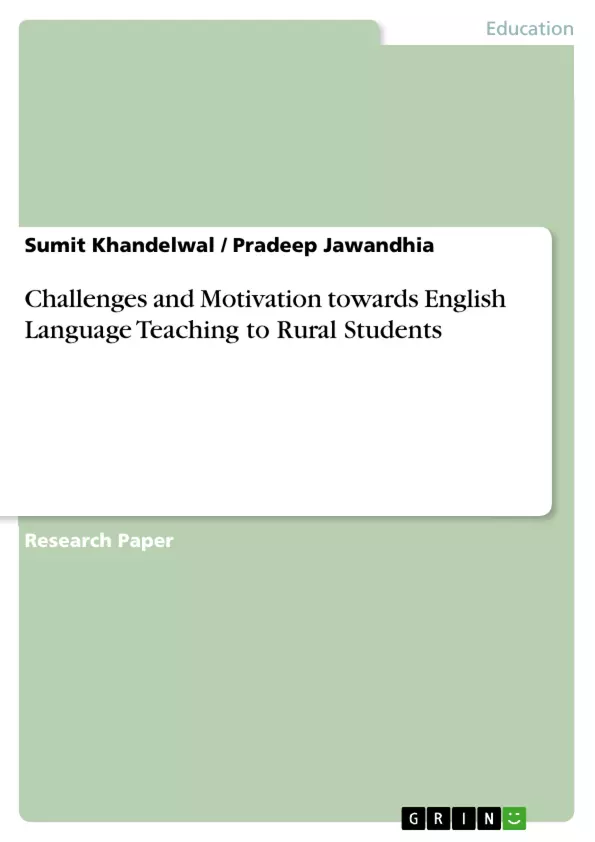Student, Especially those in developing countries, have inherited a legacy of discrimination and oppression which manifest in poverty, health issues, violence, limited access to basic needs, resources and employment. The challenges facing students in the areas of economic empowerment, access to land and access to science and technology are still a barrier to own development and it remains a challenge to level the playing fields. As Developing Nations seek to control limited resources toward the goal of achieving a developed status they must reevaluate past practices and explore available and affordable technologies. Where information and communication infrastructures are weak, use of low-cost, easily distributed technologies have proven effective. Still, many developing nations have failed to incorporate a resource in great abundance, to use these new technologies to greatest advantage. English is in India today a symbol of people’s aspiration for quality in education and a fuller participation in national and international life. It is fundamentally essential for Rural Students to learn English from a young age in this rapidly globalizing world. English knowledge will help to open many opportunities for them in the future and it will be invaluable in their future careers. However, teaching English to rural students is not an easy job, but it is also not difficult, if we already know how to do it. Many teaching positions involve teaching Rural Students - a unique experience that is both challenging and fun. The key to teaching English to Rural Students is to understand the principles of language acquisition and apply it in ways that keep Rural Students motivated to learn.
Inhaltsverzeichnis (Table of Contents)
- Introduction
- Rural Development Survey
- The Characteristics of Rural Students
- Improvement of English applicable skills
- Teaching of Language skills
- The characteristics of language teachers
- Some teaching tips
- Conclusion
- Reference
Zielsetzung und Themenschwerpunkte (Objectives and Key Themes)
This article focuses on the challenges and opportunities of teaching English to rural students in India. It aims to highlight the importance of English language skills in rural development and explore effective teaching strategies that can address the unique needs of rural learners.- The significance of English language skills in rural development and economic empowerment.
- Challenges faced by rural students in accessing quality English language education.
- Characteristics and learning needs of rural students.
- Effective teaching strategies and techniques for improving English language skills in rural settings.
- The importance of teacher characteristics and training in fostering positive learning environments for rural students.
Zusammenfassung der Kapitel (Chapter Summaries)
The article opens with a discussion of the growing demand for English language proficiency in India, particularly in the context of globalization and economic development. It emphasizes the need for English language education for rural students to achieve their full potential. The second section delves into the PURA program, a government initiative aimed at improving rural infrastructure and development. The article highlights the importance of integrating English language education within this program to facilitate rural empowerment. The article then examines the specific characteristics and learning needs of rural students, emphasizing their unique strengths and challenges. It argues that teachers need to consider these unique aspects when designing their curriculum and teaching strategies. The fourth section explores strategies for enhancing English language skills, such as reading, speaking, listening, and writing. It emphasizes the use of technology and real-world applications to make learning more engaging and relevant for rural learners. The final section, excluding the conclusion, focuses on the importance of teacher characteristics and training. It suggests that teachers who are passionate about language, patient, and understanding of individual learning styles can create positive and supportive learning environments for rural students.Schlüsselwörter (Keywords)
The key topics addressed in this article include English language teaching, rural development, student motivation, teaching strategies, teacher training, language acquisition, and the unique needs of rural learners.Frequently Asked Questions
Why is English language proficiency important for rural students in India?
English is considered a symbol of people’s aspiration for quality education and a fuller participation in national and international life. It opens many career opportunities and is essential in a rapidly globalizing world.
What are the main challenges rural students face in learning English?
Rural students often face barriers such as poverty, limited access to resources, weak communication infrastructure, and a lack of economic empowerment, which hinder their development and access to quality education.
How can technology help in teaching English to rural learners?
Where infrastructure is weak, low-cost and easily distributed technologies have proven effective. Technology can make learning more engaging and relevant by providing real-world applications of language skills.
What is the PURA program mentioned in the article?
PURA is a government initiative aimed at improving rural infrastructure. The article highlights the importance of integrating English language education within this program to facilitate rural empowerment.
What is the key to successfully teaching English to rural students?
The key is to understand the principles of language acquisition and apply them in ways that keep the students motivated, while also considering their unique learning needs and strengths.
What role does the teacher play in this educational context?
Teachers need to be passionate, patient, and understanding of individual learning styles. Fostering a supportive environment is crucial for rural students to overcome challenges in language acquisition.
- Arbeit zitieren
- Sumit Khandelwal (Autor:in), Pradeep Jawandhia (Autor:in), 2012, Challenges and Motivation towards English Language Teaching to Rural Students, München, GRIN Verlag, https://www.grin.com/document/200712



